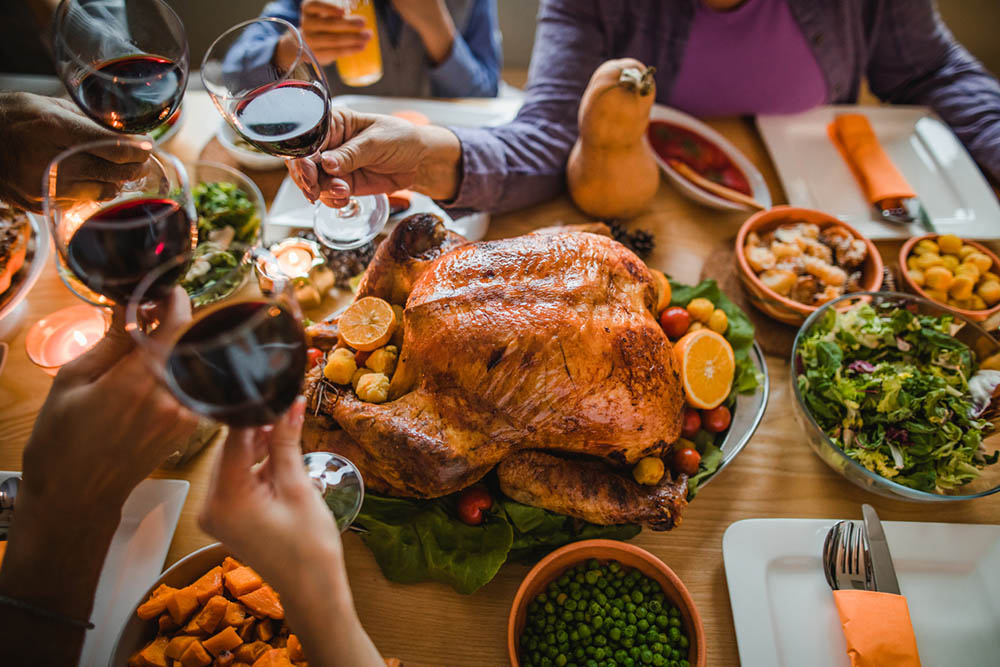Heartburn, belching and tummy ache are all symptoms of – you guessed it – indigestion. Here are 9 lifestyle tweaks that are proven to help
The colder weather can lead to an indulgence in your favourite comfort food, such as Chinese takeaway, a home cooked pasta or a Domino’s pizza. Anything to get you through that cold winter slump.
If you have over indulged this winter, chances are you are already suffering some the consequences such as heartburn, stomach pain, belching and acid reflux.
If you’re planning on continuing in this vein until the weather gets a bit warmer (which it already is by the way), here’s a guide on the causes, as well as the lifestyle tweaks, natural fixes and remedies for indigestion.
There are many factors involved in digestion, says clinical nutritionist Marta Anhelush. But at least one these key causes are behind most cases of indigestion.
Indigestion cause #1: Low stomach acid
‘Our stomach acid is absolutely vital to aid proper digestion, especially when it comes to protein rich foods such as meat or fish, which some people find hard to digest,’ says Anhelush.
‘Unfortunately, the popular view is that we often have high levels of stomach acid, leading to indigestion, where in most cases it is actually the opposite.
‘Drinking too much with your meals is also quite common and makes things worse by diluting all the digestive juices’.
What to do instead: There are some foods that actually stimulate stomach acids, thus aiding digestion.
‘Bitter foods such as rocket, watercress, chicory, turmeric or artichoke, dandelion and burdock in supplements, can stimulate the production of digestive juices, including bile to help you digest and absorb fats,’ says Anhelush.
If you have the small problem of not being able to stomach bitter foods, one study suggests the solution is to, well, eat more bitter foods and your tastes might change. Research in August this year from The American Chemical Society asked participants to eat bitter foods three times a day for a week and rate their bitterness and astringency.
Over the course of week, their bitterness and astringency ratings for the same foods reduced, and they rated them as more palatable. Or – you could try BioCare’s Artichoke Complex £19.25, taken before meals.
Indigestion cause #2: Eating too fast
Our modern, busy lifestyles mean that we often have little time to cook a meal from scratch, let alone sit at a table and eat it in peace, without any distractions, explains Anhelush.
Instead, we often eat on our way to work, in front of our computers or televisions.
This sends the wrong messages to your brain, so rather than producing digestive juices, enzymes or bile and stimulating contractions of the digestive tract, your body is producing stress hormones and increasing brain activity to process the information coming from your surroundings.
‘As a result, we end up not only with indigestion, but also other symptoms such as bloating, distension or flatulence’.
What to do instead: Stop eating in front of the telly or your work computer, obviously. But also practice more calm eating.
‘Before you start your meal, take a couple of deep breaths, then really think about what’s on your plate; what does it look like; what does it smell like – involve all the senses,’ says Anhelush.
‘That will send messages to your brain that the food is on its way, which will kick start your digestion, while helping you feel more satiated sooner’.
Indigestion cause #3: Too much sugar and refined carbs
Eating too many sugary and refined carbohydrate rich foods such as sweets, pasta, potatoes and processed foods feeds the unfavourable bacteria in our stomachs.
‘These bacteria ferment the food in the small intestines producing a lot of gas. The gas creates a lot of pressure in the intestine and this leads to stomach contents refluxing into the oesophagus causing irritation to the oesophageal lining, burning and pain,’ says Anhelush.
What to do instead: Even if your diet isn’t particularly high in sugar, you may benefit from taking probiotics if you have indigestion.
‘If you suffer from any digestive discomfort like indigestion, it is very likely that you may have an imbalance in your gut bacteria,’ says Anhelush. ‘In order to improve digestion in the long term, taking a high strength probiotic can re-balance the gut.
‘Beneficial bacteria help you to digest and absorb nutrients, while also supporting bowel movements and immunity.’
Research from Japan published in November last year found that giving patients with indigestion probiotic-rich yoghurt could help alleviate indigestion.
If you’re opting for a supplement, ‘Look out for a product from a reputable brand that use human-strain, acid resistant bacteria that have been thoroughly researched,’ says Anhelush.
‘Good strains include Lactobacillus acidophilus, bifodobacterium bifidum or Bifidobacterium lactis. The dose matters too, so make sure you get a product with at least 10 billion of bacteria’. Try BioCare’s Everyday BioAcidophilus £13.96.
Indigestion cause #4: Eating too late
‘All of our organs have a daily pattern, including the digestive tract, which tends to be more active during the day,’ says Anhelush.
‘At night, our body needs to recuperate, repair damaged tissue; our brain needs to process all the information and emotions from the day before, which means there is no time for digestion.
‘If we eat late and go to bed soon after, that food is likely to be sitting in the stomach and not being digested well, causing indigestion’.
A study published in The Journal of Gastroenterology found that those who had their dinner three hours or less before bed were more likely to suffer with acid reflux than those who left fours hours or more between their last meal and going to bed.
What to do instead: You can always try eating earlier, but that’s not always practical if you work late and is nearly impossible during the party season when dinners out might dominate your week.
Instead, try a tea that could help digestion. ‘Good combinations for digestion include fennel, cardamom, chamomile, ginger, burdock or peppermint. Make sure you get a good quality and organic tea. If you have digestive symptoms, I would recommend to brew two teabags to get a more therapeutic effect.’ Try Cleanse Tea from Pukka Herbs which contains nettle, dandelion root, fennel seed and peppermint (from supermarkets).
Indigestion cause #5: Snacking between meals
Digestion is a really long and demanding process which means it can take even up to 8 hours for your whole meal to move from the stomach to the large intestines, depending on the type and quantity of the food.
What to do instead: ‘I would highly recommend leaving a longer gap between your meals, generally aiming for three main meals without snacking,’ says Anhelush. ‘That will give the body enough time to properly digest and absorb nutrients.
‘If you feel that the pain is worse on an empty stomach and improves after eating, it may be a sign of something more serious like ulcers and should be checked with your doctor.’
Indigestion cause #6: Talking while you eat – but only sometimes
‘If you are eating lunch at your desk, in a busy office, and talking about tasks, deadlines and other things that may stress you out, it will make your indigestion worse,’ asserts Anhelush.
‘On the other hand, if you are eating at a table, with your friends or family, feeling relaxed and eating slowly whilst having a nice conversation, it is a completely different scenario.
‘Eating is, and has always been a social activity, so as long as we are eating mindfully and enjoying our food, I would encourage having company’.
Indigestion cause #7: Not chewing properly
You’ve probably heard this a thousand times before, but don’t worry we’re not going to tell you to chew everything 50 times.
What to do instead: ‘It takes far less time to chew a banana than a piece of steak,’ says Anhelush. ‘Rather than counting how many times you should chew it, try to always chew it until it’s completely mushy; imagine baby food consistency’.
Indigestion cause #8: The food
‘Generally rich foods that are high in protein, carbohydrates and sugars are more likely to cause indigestion,’ says Anhelush. ‘Christmas dinner is a perfect example of overindulgence in plenty of rich foods – processed meats, chocolates, dairy and gluten heavy foods are often culprits of digestive symptoms.’
Other foods that can cause or indigestion for some people include tea and coffee, hot spices, chocolate, tomatoes and citrus fruits can also aggravate symptoms.
What to do instead: ‘It may be worth doing a challenge by excluding tea, coffee, spicy food, tomatoes and citrus foods from your diet for a few days and then re-introducing one at a time to see if any of them worsen your symptoms,’ suggests Anhelush.
‘Digestive enzymes taken with meals can work really quickly, speeding up digestion and reducing uncomfortable symptoms,’ says Anhelush. ‘Look out for a good quality supplement that contains a range of enzymes that help digest proteins fats and carbohydrates including bromelain, lipase and amylase.’ Try BioCare Polyzyme Forte £11.95 which contains all three.
‘Also herbs such as peppermint, liquorice and ginger are very soothing and can have a calming effect if your indigestion manifests as an irritated tummy.
‘Having reflux can also irritate the delicate tissue if your oesophagus so using a soothing and healing herbs in a liquid or a powder that can be mixed into a drink, can be really beneficial,’ says Anhelush.
‘The best herbs to include are slippery elm, licorice, marshmallow and aloe vera. They help to coat the digestive tract, providing a protective layer, hence reducing irritation’. Try BioCare’s Slippery Elm Intensive £32.95 which contains slipper elm, licorice, marshmallow and aloe vera extracts.
Indigestion cause #9: Your drinking habits
Alcohol that is high in sugars such as cocktails and flavoured wines, may aggravate or cause indigestion, Anhelush asserts.
‘Yeast and gluten-based alcohols such as beer and cider as well as alcohol high in sulphites such as red wine can also be strenuous on the digestive system and our detoxification pathways’.
What to do instead: No one is suggesting you give up alcohol this summer (don’t worry), but you can make some smarter choices.
‘Keep hydrated if you do drink alcohol and arm yourself with a nutrient dense meal beforehand full of dark green leafy vegetables and high-quality protein such as organic chicken or wild fish,’ Anhelush advises.
You could also trying gently detoxing your body. ‘This can reduce your chances of weight gain and feeling generally fatigued and run down,’ Anhelush suggests.
‘Green vegetables and fruits really are your friend at this time as they are packed full of nutrients and support the detoxification process of rich food and alcohol from your body.
Smoothies made with kale, spinach, broccoli, and apples can be a great way to ensure your body is getting the nutrients it needs.
‘You can also put green vegetables into a soup for lunch or dinner, adding in herbs such as coriander, which is highly detoxifying and full of plant chemicals’.
It’s also worth nothing that studies have found that medicines such as Zantac Relief often taken for indigestion may have an adverse effect on blood alcohol levels when you;re taking them with alcohol, so talk to your doctor if you’re on them.
More Healthista Content:
7 signs it’s a common cold and you DON’T need antibiotics
20 eco-friendly fitness gear MUST HAVES
Trying to conceive? This new at-home fertility test is as reliable as lab testing
Got a cough? 6 coughing etiquette secrets you need to know
Like this article? Sign up to our newsletter to get more articles like this delivered straight to your inbox.


























































